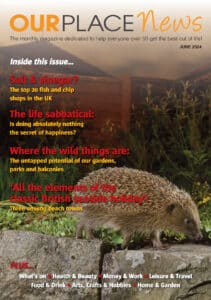From personalising your space to dressing to express, five experts in business culture and office design share their tips on how and why employees should bring more of themselves into the workplace.

Depending on your line of work, expressing your personality at the office can feel awkward – or even unthinkable. But when employees are allowed to more fully express themselves in their workspace, it can make a big difference to their wellbeing, and
to their work.
“The average person will spend a third of their life at work, and if you’re made to leave your personality at the door, that’s going
to have a huge impact on your mental health, your identity and your self-confidence,” says Jessica Andrews, founder of branding consultancy Rabbit & Other Stories. “In turn, your motivation, your productivity, and your results will suffer; and for a company, that’s not good news.”
So what else do the experts have to say about adding a degree of personalisation in the workplace?
Home away from home
Bringing personal items into the office is sometimes frowned upon, but there is research that suggests that employees who can personalise their workspace are up to 25% more productive.
“Even before Covid, workspaces were becoming more open-plan, in the hope of encouraging collaboration and innovation,” says leadership development consultant and coach Zoe Poulton, founder of Glass Ripple Consulting. “However, this has meant levels of privacy and ownership of space have reduced, causing higher levels of emotional exhaustion.
“By bringing in personal items such as photos, ornaments, or a favourite mug, workers are provided with a greater sense of ownership and control over their space, which contributes to enhanced wellbeing.” And if you’re working from home, ditching the virtual Zoom background can also help you flex your personality. “These glimpses open up new conversations – and, often, new opportunities,” says Poulton.
Dressed to skill
With a majority of prospective job-hunters saying that a dress code negatively impacts how they see a business, it’s worth
relaxing the rules.
“Every time we pick an outfit to wear, we’re non-verbally communicating our personality to the world,” says Poulton. “These clothes reflect our moods and how we want to express ourselves.”
“A number of studies show that greater authenticity is linked to higher levels of happiness,” adds Chris Preston, director of The Culture Builders.
“Any company worth its salt should want to snap up confident, connected and contented people, because they bring with them a huge competitive and cultural advantage.”
Highlight your uniqueness
Share your ideas and perspectives, too – even when it feels daunting. “So often, we hold ourselves back from sharing our thoughts, in case we’re somehow ‘wrong’,” says Grace Temporal Sorabji, CEO and founder of Cultural Calculator.
“For some, sharing what we believe can feel like a scary cliff to jump off, as though there will be some major consequences that follow, when in reality we give it too much weight – it’s simply a perspective being shared.
Research has proven that the more psychological safety there is in an organisation to speak up, the higher the business performance is. This can’t happen without each of us being willing to share our knowledge, intuition, and unique perspective.”
Rock around the clock
Even though many of us are moving away from an “always-on” culture, work inevitably leaks into our day beyond office hours. “We talk a lot about the need for people to be their authentic selves at work, but it’s not just about the nine-to-five – it’s the getting dressed and thinking about your morning, the trip in, the trip home, and the unwinding,” says Preston.
Crossover items such as the laptop or car employees use both in and out of office hours can also help them express themselves, he says. “If we feel like our company car is aligned to our personality, for example, we feel more aligned to the organisation. Driving to work in a vehicle you love is a big thing, and sees you stepping into work in a positive mood.”
Space to be
Specialised areas where furniture, tech and tools can be adapted to suit users’ needs and personalities give employees a chance to express themselves, as well as supporting diversity and inclusivity. And according to workplace wellbeing consultant Kirsty Hayward, these “hack spaces” can also give employers an insight into how their people want to work.
“If you’re an employer, you want to be able to promote diversity of choice and employee independence,” says Hayward. “Give your staff the opportunity to decide how to work with the tools, spaces and environment you can provide them with, and the result will be productive and engaged employees – and there’s a strong correlation between empowerment and performance.”
(Article source: The Guardian)

